He might not eat the flesh of his victims, but you might. Come again? You see, the cannibal, or, I should say, non-cannibal, at the centre of The Cannibal Man doesn't consume the flesh of the seemingly unending concourse of brunettes who show up at his door. Um, why do these, "brunettes" as you call them, keep showing up? Well, once a brunette goes missing, invariably another brunette will turn up looking for the brunette that came before them; it's a dark, auburn-tinted vicious cycle. Coming to the realization there won't be any room left in his modest house, located in the shadow of a luxurious highrise, to store their bodies if things continue at this pace, he decides to recycle them. Do I mean bury them in the ground, in other words, does he add them to nature's compost heap? Not exactly. Does he burn them? Not quite. Okay, I give up, what does he do with them? He takes them to the slaughterhouse he works at. Yeah, that makes perfect sense. Sure, it's gross and junk, but it takes care of his body problem. Though, I must say, the movie mustn't be very long. I mean, how long does it take to transport a few bodies to the slaughterhouse? Seriously, just plop them in the trunk of your car and you should be turning Javier and Maria into ground beef in no time. What's that? You say the so-called "cannibal man" doesn't have a car. Oh boy, this could be a problem. Didn't any those nosy brunettes bring a car? What I mean is, you could use their car to take their bodies to the slaughterhouse. No? You better make sure. Check their pockets. No car keys, eh? I don't know what to say, but you better head down to the drugstore to buy some air fresheners, 'cause your house is going to start to smell in a couple of days. And to think, all this could have been avoided had it not been for Generalissimo Francisco Franco. Huh? Don't "huh" me, you know exactly what I'm talking about. Oh, wait, you probably don't.
If you have seen The Cannibal Man, directed by Eloy de la Iglesia, you know exactly what I'm talking about. But for those who haven't, let me explain. Without going into much detail about Francisco Franco, he ruled Spain with an iron fist for many years. And because of this, the people grew to fear the police. This was especially true for the country's working poor. So, you have to remember, when Marcos (Vincente Parra) tells Paula (Emma Cohen), his leggy well-to-do girlfriend/fiance, that he doesn't trust the police, he's got good reason not to.
Wow, it sounds like this film has some depth to it. You could say that. And not only that, it also has a dry sense of humour. We get a taste of it almost immediately when we see Marcos calmly eating a sandwich in the vicinity of a bunch of cows who are in the process of having their throats slit.
Quick question: Marcos' leggy well-to-do girlfriend/fiance wouldn't happen to be a brunette, now would she? Why do you ask? Oh, I was just wondering, you know, since the people killed in this film are mostly brunettes, if she's one of his victims. Don't be silly, Marcos would never harm something so leggy. Just kidding, leggy or not, he'll kill just about anyone who gets in his way.
What's weird is, his killing spree starts so innocently. After spending all day surrounded by dangling cow carcasses at Flory (the meatpacking company he works at), Marcos is looking forward to hanging out with his leggy girlfriend. Grabbing a quick bite to eat at a local diner, and flirting a bit with the luminous Rosa (Vicky Lagos), the diner's aggressively milfy waitress, Marcos meets Paula in the subway. (Is there anything more annoying than subway riders who won't let the passengers get off the train before trying to get on themselves?)
Remember when the Soup Nazi scolds Jerry and his shmoopy-adjacent girlfriend for kissing in his line? No? How come? Don't you watch Seinfeld?!? Anyway, the taxi driver disapproves of the impromptu make-out session Marcos and Paula are currently engaging in in the back of his cab. Instructing them to leave his cab immediately, an argument ensues. Get this, the cab driver expects them pay the fare. But he didn't take them where they wanted to go? Exactly. Now, did the cab driver deserve to be killed? Probably not. But the moment he started hitting Paula was a game changer. In an attempt to stop the cabbie from slapping around his fiance–his leggy fiance, yeah, right, his leggy fiance–Marcos picks up a rock and hits him over the head.
While reading the paper the next day at work, Marcos discovers that the taxi driver he hit over the head is dead. In an unexpected twist, Paula insists that Marcos go to the police. Actually, as we'll soon find out, that's not that unexpected. Like I was saying, the rich trust the police, while the poor don't. And Marcos, judging by the dilapidated state of his home, is definitely poor. After some satisfying make-up sex (the look on Paula's face as she was being repeatedly penetrated by Marcos' Iberian penis practically screamed satisfaction), Marcos and Paula are back it.
You can see the exact moment Marcos decides to murder Paula, and it occurs when Paula gives Marcos an ultimatum. Pretending to go along with Paula's plan to turn himself in, Marcos pulls the old kiss and choke routine on her. As he slowly drains the life out of her, rendering her once leggy legs limp and useless, Marcos looks sad, yet at same time, seems relieved to be rid of her.
If only the prudish cabbie hadn't disapproved of their backseat make out session. If only Paula wasn't so gung-ho about going to the police. If only... well, you get the idea. Determined not to go the police, Marcos winds up killing everyone, and I mean, everyone, who tries to expose his dastardly deeds. In every case, though, Marcos gives each victim a chance to save themselves. Of course, the victims have no idea their lives are in jeopardy when Marcos throws them a lifeline, so they, more often not, fail to change his mind, ipso facto, he kills them.
Since I don't want to go into detail about each murder, let's just say, Marcos has no qualms about killing people. Maybe he's worked at the slaughterhouse too long, or maybe this is what happens to some folks after having lived so long under a fascist regime. While the murdering part might not be a direct result of fascism, the fear he has of authority is definitely a byproduct of fascism.
Using a wrench, a knife, a meat clever, and his bare hands to dispatch the dark-haired confluence that show up at his door, Marcos turns killing people in confined space into an exact science. Only problem being, what to do with the bodies after he's killed them? Employing the aforementioned meat clever, Marcos chops a piece off each victim, puts them in a sports bag, and takes them to work. When no one is looking, he dumps them in the machine used to make broth.
You'll no doubt notice that Marcos' sports bag is rather small. Which means this could take a while. And with no let up in the nosy brunettes who keep showing up at his door in sight, and, not to mention, the intensity of the stench (wild dogs have started hanging around his house), Marcos better find a faster way to dispose of the bodies.
In-between all this ghastliness, Marcos develops a friendship with Néstor (Eusebio Poncela), a well-to-do gay man who lives in the fancy highrise that overlooks Marcos' squalid shack. Besides sexual orientation, you can tell Marcos and Néstor come from different backgrounds when the latter uses words like, "demigod" and pariah," and the former looks at the latter with confusion.
The point I was making before about the way rich and poor people interact with the police is hit home when Néstor and Marcos are asked to show their identification badges to some fascist goons while enjoying a drink at a late night cafe. While Marcos nervously struggles to get his I.D. out of his wallet, Néstor calmly shrugs his shoulders and tells them that he forgot it at home. Check out the demenour of the cops when they find out Néstor lives in one of them swanky new highrises, the way they start to fawn all over him is sickening. It doesn't justify Marcos' killing spree, or his unorthodox approach to body disposal, but it does give us some insight as to why he bristled at Paula's initial request to go to the police.
And, at the end of the day, that's the main lesson I took away from The Cannibal Man, and, that is, fascism is bad. Actually, forget about fascism. Dictatorship or not, the quality of your treatment when interacting with law enforcement totally depends on your social status no matter where it is you live. Whether it be fascist Spain or midtown Manhattan, you are what's in your wallet.


















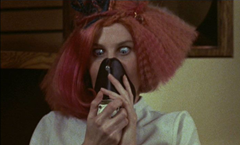
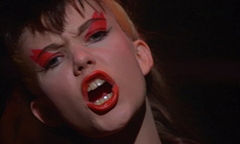








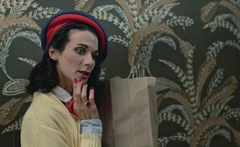
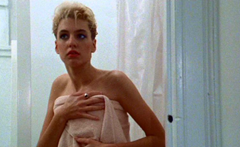






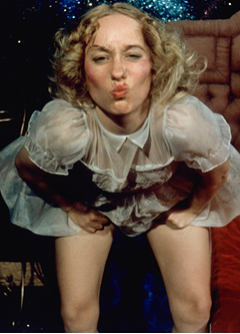


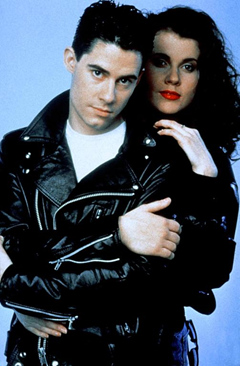


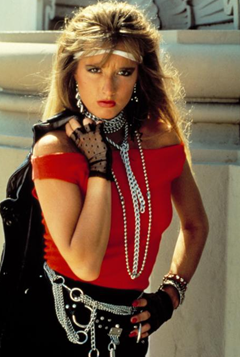





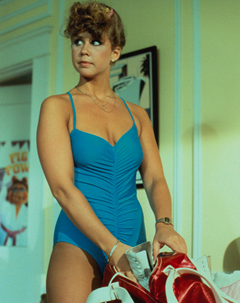













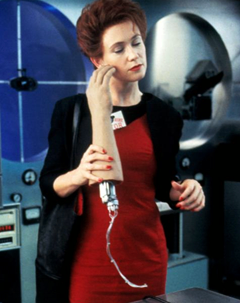


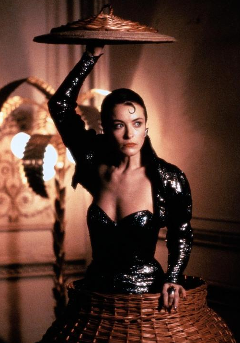


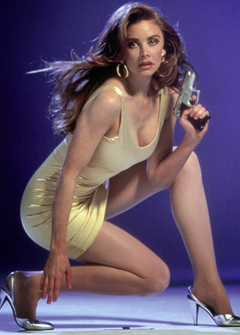
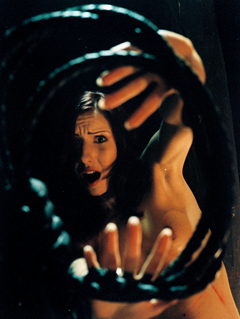
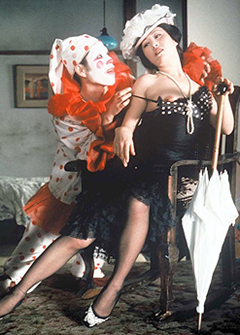
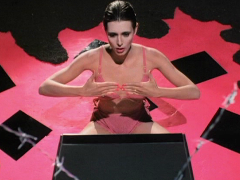
I looked up De La Iglesia and he sounds like an extremely interesting filmmaker. Spain under Franco is something I know very little about. However, all of the Spanish films I've seen that were filmed under his reign exude a real sense of paranoia and terror. Even the low-budget creep fests Paul Naschy was busting out have this unsettling edge of constant betrayal and fear of authority. Or authority being completely corrupt and tyrannical. "Blue Eyes of the Broken Doll" (Los ojos azules de la muñeca rota) written by and starting Naschy and direct by Carlos Aured is a good example. The kind of films de la Iglesia was making were most likely deeper but I wouldn't be surprise if the fascist regime made everyone antsy.
ReplyDeletep.s. "Blue Eyes of the Broken Doll" is a recommended film if you can get the uncut version in the original language. Kind of wacky, but creepy, and its got knee boots in Spain.
I'm adding "Blue Eyes of the Broken Doll" to my list.
ReplyDeleteYou will not be disappointed.
ReplyDelete